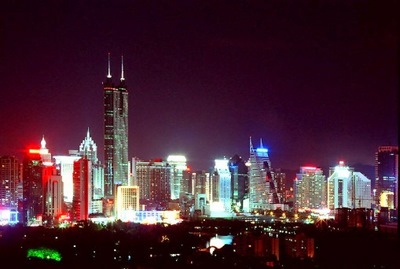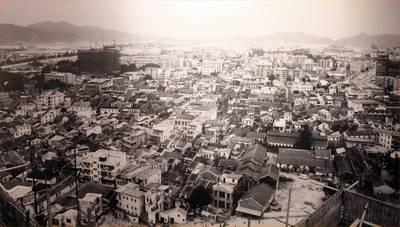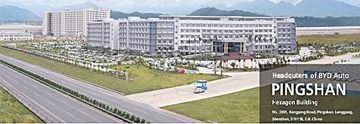NextInsight brings you a series of interviews with expatriates who call the southern Chinese metropolis of Shenzhen both their workplace and home.

Our aim is to offer insights into what could be The Next Big Thing – Shenzhen – a city whose GDP growth and population have outpaced those of its richer neighbor, Hong Kong, for as long as this writer can remember.
We also hope to bring a series of revealing snapshots on just what it takes for non-locals to live and work here, and thrive while doing so.
A common thread linking these industrious expats together is how they have taken the best from their diverse cultural backgrounds to make a name for themselves in a faraway place like Shenzhen.
In this first installment, we meet German expat Mandy Seibold (
For the past nine years, she is has been living and working in China, currently in Shenzhen, a city with an official population of 14 mln (think TWO New Yorks).

In official population-measuring parlance, this figure admittedly includes a sizeable “floating population,” a necessary asterisk in Shenzhen given the phenomenal explosion in the number of people calling it home over the past several years – if only for the time it takes to work overtime at a local toy factory in the leadup to the Christmas (read: exports) rush.
It has led to Shenzhen’s population increasing 35 fold in the past 30 years, and also gives it the somewhat dubious distinction of being China’s most crowded city with over 5,940 people per square kilometer (2008 est).
So between avoiding swinging briefcases, elbows and a growing number of nightspots -- and struggling to decide if we were real Shenzheners, “floating” residents or perhaps just “semi-submersible” at best -- Ms. Seibold and I found a chance to chat about the city we currently call home, and how she found doing business in the most crowded city in the world’s most populous country.

Photo: Internet
NextInsight: How would you describe the business operating climate in Shenzhen compared to that in your homeland?
Ms. Seibold: Regarding my specific work, I would say China is more flexible. Sure, they look for good people with excellent skills and knowledge, but you can easily get a chance without having a particular degree or when having a degree in other fields. Chinese seem to be more open and let you try and then evaluate your work based on their particular needs at that very moment. They might not operate with such a long run vision as business people do back home, the (financial) success at present or in the very near future seems sometimes more important than anything else. I also believe that Chinese do not think as much into detail when planning, they rather do and then adjust later. That was difficult for me at the beginning, since we (Germans) tend to plan every possible 'wrong' direction and have a Plan B and C already. But I learned to appreciate this circumstance, since it gives you opportunities you might have not thought about before.
NextInsight: What are the most obvious changes you have witnessed or sensed during your time here?
Ms. Seibold: During my time in China I have seen many changes in many areas, not only in business. In my line of work, I saw an increase of translators, many good, but at least as many bad. Since I have worked with the same clients over the years, I can say that the quality of work has improved much. At the beginning I was given English texts of very very low quality (translated from Chinese to English), which often put challenges on my work and understanding, even resulting in bad work of my own. Quality tests and proofreading were not a big part of the business back then. Nowadays, I get texts of much better and sometimes superb quality. Companies hire foreigners or cooperate with foreign companies in different fields in order to provide competitive translation services, competitive not only in terms of price. English skills and 'international' education have improved vastly in comparison to nine years ago, when I arrived first.

NextInsight: If your children (current or future) told you they wanted to settle in China, specifically Shenzhen, study, work and raise a family here, how would you feel?
Ms. Seibold: Difficult to answer, since it is speculative, but I guess I would just encourage them. Since I am (or would have been) here myself, I know it is a good place to be, with many opportunities, both in terms of business and good lifestyle. China still holds opportunities for people with creativity and willingness, plus it is an amazing experience I would not want my children to miss. I didn’t want to miss it myself.
NextInsight: If the economy in Shenzhen slows or softens considerably, would you immediately relocate, or do you feel China is your home and you will ride out the rough times?
Ms. Seibold: Well, we all experienced the economic crisis and were affected in one way or the other. Many factories closed here in Guangdong. I actually did quit a 'safe' job during that time and started over. It was risky, but as I said before, opportunities are there, you just need patience, knowledge, a little networking. Immediate relocation is not an option, since I would face the same situation back home, I would not see the absolute benefit for me by leaving. My coming to China in the first place was motivated by language and cultural reasons (studies), not primarily by business, I can handle it if things are bit slow, so I stayed and am glad I did because more doors have been opened for me now after the slow recovery. It's always good to be patient in China.

NextInsight: What are some of the best things about doing business in China today?
Ms. Seibold: It is good that not everything is set, so people can adjust it their way in order to achieve best results (of course this can also be a disadvantage, depending on the perspective). I am not sure this is too simplistic, but I think that whatever brings money will be done by Chinese, and that is what drives them forward, so things are just possible without talking them down to impossibility. China has its own agenda and rules (official and unofficial), sometimes business is very easy because not too many labor and environmental issues block procedures.

Maybe we can call it contradictory. Whatever is good or not good, is not good or good from any other angle or point of view. Maybe that’s why I like working here, its not just either or, every situation can be taken as an advantage.
What things would you most like to see changed?
I am not sure I want to change things. China is China, not Europe or America, and they make that very clear anyway. Plus, international or intercultural business always brings challenges, difficulties, frustrations.
And it is easy to point fingers and say 'why are they like this, why cant they just be like that, etc etc'. I am sure Chinese ask themselves the same questions. But sometimes it is easier to just give in a little and change or at least to compromise about our own specific ideas.
For me, I just try to understand the Chinese way of thinking, then try to adjust and get the best result. I feel able to do so without giving up myself or my values or beliefs. Of course I have my bad days in China, but trying to change the Chinese will just give me more headaches. Living and working in China is different from everything I ever thought; China will change at its own speed, the rest of the world will change, so will I, and business will always find its way.







